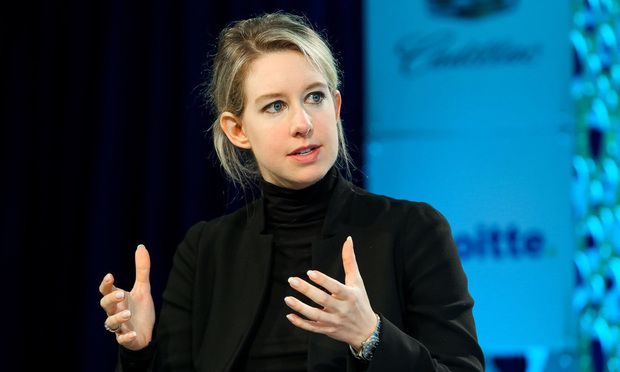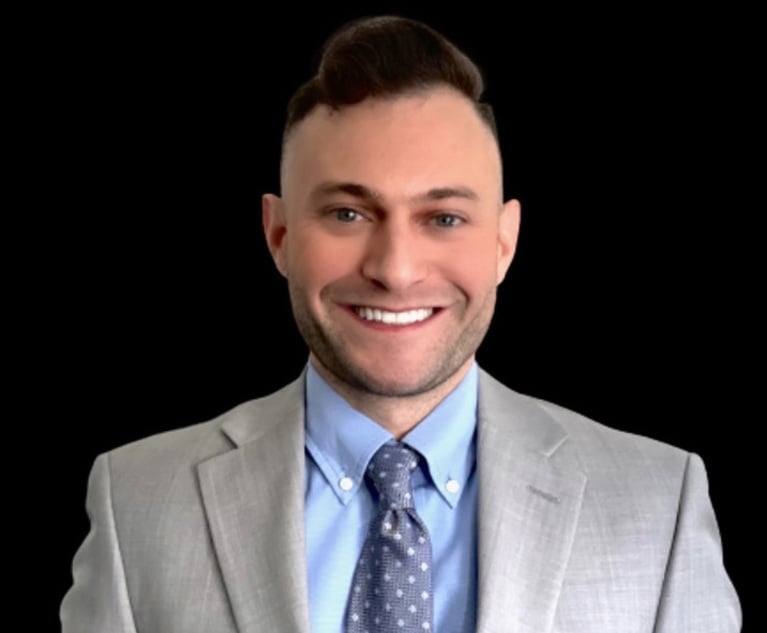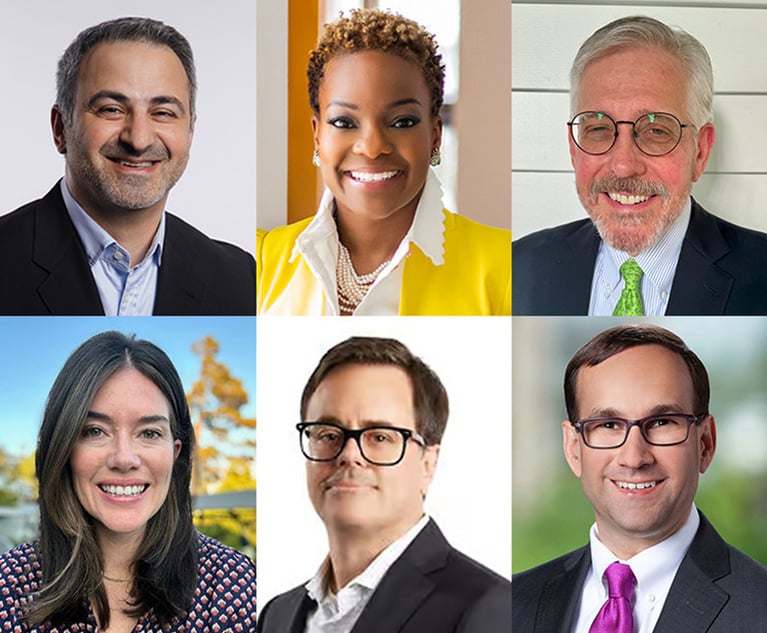Lawyers for Elizabeth Holmes Urge Pushback of August Trial Date, Prosecutors Endorse October Start
"Quite simply, we believe this is not the first or even one of the first cases that should be tried as the courts adopt new procedures and make adjustments for safe public health while conducting trials, given several unusual characteristics," wrote Holmes' lawyers at Williams & Connolly, citing the months-long trial schedule and crowds of onlookers outside the courthouse for prior hearings.
April 14, 2020 at 07:00 PM
4 minute read
 Elizabeth Holmes
Elizabeth Holmes
Defense lawyers for Elizabeth Holmes are set to ask a federal judge in San Jose to push back an August trial date in the criminal fraud case against her, in part due to the COVID-19 pandemic.
Holmes' lawyers at Williams & Connolly filed a joint status report with federal prosecutors that indicated that the parties were close to reaching a compromise on pushing the start of trial back to some point in October. The two sides failed to reach an agreement on a proposed date, however, after the government indicated that it intended to seek two additional charges against Holmes related to patients who paid for the defunct company's blood-testing services and to add allegations the alleged conspiracy to mislead investors, patients and doctors about the accuracy of the company's tests dated back to 2010.
Holmes declined to waive her right to be charged by indictment and let the government, which currently can't seek an amended indictment because of the suspension of grand jury proceedings in the Northern District, to move forward with an amended information—a charging document that doesn't require grand jury sign-off.
"Counsel for Ms. Holmes does not understand why it took the government nearly two years post-indictment, and more than five years into its investigation, to bring these new charges," wrote her lawyers. "Nor does counsel understand why the government disclosed its intention to bring these new charges so late in our collective discussions about a trial schedule."
Federal prosecutors indicated that whether or not the indictment is superseded the trial can continued as schedule or with an October start date.
Beyond the dispute over the charging document, Holmes' lawyers indicated that they had initially asked for trial to be pushed back until early 2021. If the government were to seek further charges and to expand the scope of the alleged conspiracy, Holmes' lawyers wrote that an October trial date wouldn't be feasible.
"Quite simply, we believe this is not the first or even one of the first cases that should be tried as the courts adopt new procedures and make adjustments for safe public health while conducting trials, given several unusual characteristics," wrote Holmes' lawyers. In particular they noted that the trial was set to last for months, and the courtroom would likely be crowded.
"The defense, jurors, and witnesses will all enter the courthouse through crowds of onlookers who have often approached and even touched counsel and the defendant during entry to the building," Holmes' lawyers wrote. "We are confident that the Court and all trial participants will make all possible adjustments and work through these and other health-related issues as safely and diligently as they possibly can, but it remains true that in a trial of this length, with this number of participants, significant risks remain."
U.S. District Judge Edward Davila of the Northern District of California, who is overseeing the case, earlier this month asked the parties to confer on whether keeping the current trial date, with jury selection set for late July and openings set for early August, was feasible given the constraints the pandemic has placed on trial preparation. A telephonic hearing before Davila is scheduled for Wednesday morning.
Read more:
Despite COVID-19, Judge in Elizabeth Holmes Fraud Case Pushes Forward With Summer Trial Date
Elizabeth Holmes' Lawyer Assails Theranos Prosecution as 'Massive Case With Undefined Contours'
Theranos Prosecutors: 'Common Sense' Only Thing Needed to Understand Charges Against Holmes
This content has been archived. It is available through our partners, LexisNexis® and Bloomberg Law.
To view this content, please continue to their sites.
Not a Lexis Subscriber?
Subscribe Now
Not a Bloomberg Law Subscriber?
Subscribe Now
NOT FOR REPRINT
© 2025 ALM Global, LLC, All Rights Reserved. Request academic re-use from www.copyright.com. All other uses, submit a request to [email protected]. For more information visit Asset & Logo Licensing.
You Might Like
View All
'Pull Back the Curtain': Ex-NFL Players Seek Discovery in Lawsuit Over League's Disability Plan

'Be Comfortable Being Uncomfortable': Pearls of Wisdom From 2024 GC Q&As


Insurers Dodge Sherwin-Williams' Claim for $102M Lead Paint Abatement Payment, State High Court Rules
Law Firms Mentioned
Trending Stories
- 1BOI Reports: What Business Owners and Attorneys Should Know
- 2SurePoint Acquires Legal Practice Management Company ZenCase
- 3Day Pitney Announces Partner Elevations
- 4The New Rules of AI: Part 2—Designing and Implementing Governance Programs
- 5Plaintiffs Attorneys Awarded $113K on $1 Judgment in Noise Ordinance Dispute
Who Got The Work
J. Brugh Lower of Gibbons has entered an appearance for industrial equipment supplier Devco Corporation in a pending trademark infringement lawsuit. The suit, accusing the defendant of selling knock-off Graco products, was filed Dec. 18 in New Jersey District Court by Rivkin Radler on behalf of Graco Inc. and Graco Minnesota. The case, assigned to U.S. District Judge Zahid N. Quraishi, is 3:24-cv-11294, Graco Inc. et al v. Devco Corporation.
Who Got The Work
Rebecca Maller-Stein and Kent A. Yalowitz of Arnold & Porter Kaye Scholer have entered their appearances for Hanaco Venture Capital and its executives, Lior Prosor and David Frankel, in a pending securities lawsuit. The action, filed on Dec. 24 in New York Southern District Court by Zell, Aron & Co. on behalf of Goldeneye Advisors, accuses the defendants of negligently and fraudulently managing the plaintiff's $1 million investment. The case, assigned to U.S. District Judge Vernon S. Broderick, is 1:24-cv-09918, Goldeneye Advisors, LLC v. Hanaco Venture Capital, Ltd. et al.
Who Got The Work
Attorneys from A&O Shearman has stepped in as defense counsel for Toronto-Dominion Bank and other defendants in a pending securities class action. The suit, filed Dec. 11 in New York Southern District Court by Bleichmar Fonti & Auld, accuses the defendants of concealing the bank's 'pervasive' deficiencies in regards to its compliance with the Bank Secrecy Act and the quality of its anti-money laundering controls. The case, assigned to U.S. District Judge Arun Subramanian, is 1:24-cv-09445, Gonzalez v. The Toronto-Dominion Bank et al.
Who Got The Work
Crown Castle International, a Pennsylvania company providing shared communications infrastructure, has turned to Luke D. Wolf of Gordon Rees Scully Mansukhani to fend off a pending breach-of-contract lawsuit. The court action, filed Nov. 25 in Michigan Eastern District Court by Hooper Hathaway PC on behalf of The Town Residences LLC, accuses Crown Castle of failing to transfer approximately $30,000 in utility payments from T-Mobile in breach of a roof-top lease and assignment agreement. The case, assigned to U.S. District Judge Susan K. Declercq, is 2:24-cv-13131, The Town Residences LLC v. T-Mobile US, Inc. et al.
Who Got The Work
Wilfred P. Coronato and Daniel M. Schwartz of McCarter & English have stepped in as defense counsel to Electrolux Home Products Inc. in a pending product liability lawsuit. The court action, filed Nov. 26 in New York Eastern District Court by Poulos Lopiccolo PC and Nagel Rice LLP on behalf of David Stern, alleges that the defendant's refrigerators’ drawers and shelving repeatedly break and fall apart within months after purchase. The case, assigned to U.S. District Judge Joan M. Azrack, is 2:24-cv-08204, Stern v. Electrolux Home Products, Inc.
Featured Firms
Law Offices of Gary Martin Hays & Associates, P.C.
(470) 294-1674
Law Offices of Mark E. Salomone
(857) 444-6468
Smith & Hassler
(713) 739-1250






